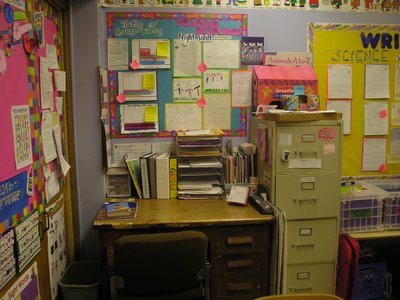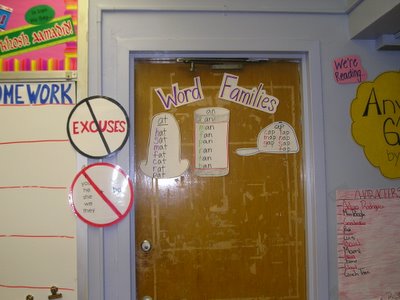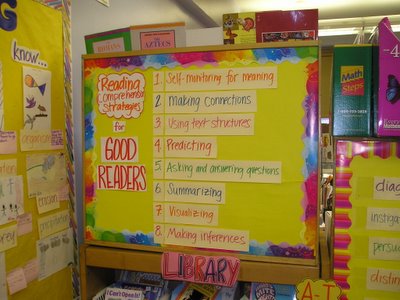I've been absent, I know.
I'll be back next week when I don't have a yearbook due and a month's worth of grad work to catch up on.
Wednesday, March 29, 2006
Thursday, March 23, 2006
A Great School
On Wednesday I went to observe a school in Brooklyn set up by TFA. The school is in Sunset Park (oh so close to my apartment). The visit was really eye opening.
The reason that I chose to look at this school (versus the others on the "City wide school visit" list) was because it has a strong bilingual and ESL program. The school is located in a predominately Hispanic neighborhood and according to the principal, 60% of the kids are ELL (English Language Learner) though basically all of them are because they come from Spanish speaking households. It was so weird to see a school that has so much focus on ESL (they have pull-out, self contained, bilingual and dual language) coming from my school where ESL is only noticed when the principal gets an email telling me I have a meeting to attend or the AP sees that I have interim assessments to give my students.
One of the major things that I observed at the school was the supportive administration. The teacher who gave us a tour of the school (also a first year TFA corps member) could not stop gushing about how wonderful her principal and AP are. I met them both and they were very friendly and positive. The principal talked about getting the teachers together as a team to make the school successful.
I got to the school a bit before 8:30. I noticed that all of the kids were already in the classrooms working quietly (unheard of at my school). I was a bit confused as I thought I was early so I was wondering how they got in the building so quickly. As I found out, they actually arrived at 8:00 for the 37.5 minutes. It was amazing to see the school actually using the extra time to benefit the students. In every room they were actually working. Just peeking in the windows I saw guided reading, students working in groups at desks, manipulatives, etc. At my school everyone is so tired by the end of the day (not really an excuse, but . . .) that the after school time is just a time filler. If it takes 20 minutes to walk half the kids downstairs and the other half up, all the better. But this post is not about my school . . .
Seeing this school made me want to teach on a school like this that has a large ELL population (and of course a great administration). There are so many opportunities to have a self contained class. I really love ESL kids, too. I love the idea of speaking more than one language. I think it is so important and to be valued.
(Ideally next year I could get a position teaching a self contained lower elementary ESL class. That would be the best of both worlds. TFA is not all about switching schools before the two years though so I highly doubt that that is even a small possibility).
The other thing that I noticed (and this may be silly) is how QUIET the school was. Not only were there not any loud outbursts coming from classrooms, but there were NO kids in the halls. I don't think I even saw a kid go to the restroom with a pass. (This as compared to my school where it is common to see a pack of 4-5 boys sprinting back and forth through the halls). What I did see in the halls were a lot of small groups working with reading intervention teachers. Yes, ideally they should be working in rooms at tables but this was amazing because one, it was quiet enough for them to be able to do this and two, because they actually have quality work going on with kids being pulled out of class.
Overall, I think seeing the school made me regretful about what my school could be if only . . . I also really wish that I had had more time to talk with the pull out teachers individually so I could get a sense of their set up, what they teach the kids, best practices for pull out, etc. Maybe I can schedule a specific time to speak with them later.
The reason that I chose to look at this school (versus the others on the "City wide school visit" list) was because it has a strong bilingual and ESL program. The school is located in a predominately Hispanic neighborhood and according to the principal, 60% of the kids are ELL (English Language Learner) though basically all of them are because they come from Spanish speaking households. It was so weird to see a school that has so much focus on ESL (they have pull-out, self contained, bilingual and dual language) coming from my school where ESL is only noticed when the principal gets an email telling me I have a meeting to attend or the AP sees that I have interim assessments to give my students.
One of the major things that I observed at the school was the supportive administration. The teacher who gave us a tour of the school (also a first year TFA corps member) could not stop gushing about how wonderful her principal and AP are. I met them both and they were very friendly and positive. The principal talked about getting the teachers together as a team to make the school successful.
I got to the school a bit before 8:30. I noticed that all of the kids were already in the classrooms working quietly (unheard of at my school). I was a bit confused as I thought I was early so I was wondering how they got in the building so quickly. As I found out, they actually arrived at 8:00 for the 37.5 minutes. It was amazing to see the school actually using the extra time to benefit the students. In every room they were actually working. Just peeking in the windows I saw guided reading, students working in groups at desks, manipulatives, etc. At my school everyone is so tired by the end of the day (not really an excuse, but . . .) that the after school time is just a time filler. If it takes 20 minutes to walk half the kids downstairs and the other half up, all the better. But this post is not about my school . . .
Seeing this school made me want to teach on a school like this that has a large ELL population (and of course a great administration). There are so many opportunities to have a self contained class. I really love ESL kids, too. I love the idea of speaking more than one language. I think it is so important and to be valued.
(Ideally next year I could get a position teaching a self contained lower elementary ESL class. That would be the best of both worlds. TFA is not all about switching schools before the two years though so I highly doubt that that is even a small possibility).
The other thing that I noticed (and this may be silly) is how QUIET the school was. Not only were there not any loud outbursts coming from classrooms, but there were NO kids in the halls. I don't think I even saw a kid go to the restroom with a pass. (This as compared to my school where it is common to see a pack of 4-5 boys sprinting back and forth through the halls). What I did see in the halls were a lot of small groups working with reading intervention teachers. Yes, ideally they should be working in rooms at tables but this was amazing because one, it was quiet enough for them to be able to do this and two, because they actually have quality work going on with kids being pulled out of class.
Overall, I think seeing the school made me regretful about what my school could be if only . . . I also really wish that I had had more time to talk with the pull out teachers individually so I could get a sense of their set up, what they teach the kids, best practices for pull out, etc. Maybe I can schedule a specific time to speak with them later.
Wednesday, March 22, 2006
Leaving ESL
No, not me. One of my students.
At one of my ESL meetings earlier in the year, I learned that there is a second way to get out of ESL (the first of course, is passing the NYSESLAT). If a student has an IEP, the team/committee (I don't know exactly what they are called) can decide that the student does not need ESL and by simply checking a box on the IEP can take the student out of ESL. They didn't say what circumstances would warrant taking a student out of ESL who hadn't passed the test (that wasn't the topic of the meeting) but I immediately thought of a student who I thought should be "X-coded" out of ESL.
This student, E, essentially speaks English as her first language. She got into ESL in the typical way. When she registered for kindergarten her parents marked on her home language survey a certain number of boxes that indicated that she spoke or understood a language other than English (in her case Haitian Creole) and that it was the dominant language in the household. That survey allowed her to be tested for ESL and her low score is what got her in to ESL. I only met her this year so I don't know how much Haitian Creole she at one point knew, but as of meeting her this year she barely understood the concept that people speak other languages. I later learned that she no longer lives with her biological parents and so is not even exposed to another language let alone is she able to speak one.
So, why can't she get out of ESL? She just can't pass the NYSESLAT. It's not a hard test but students who are low level can have trouble passing it even if there is no language barrier. E is a very good student. She tries her best, does neat work and likes to participate but something is not there. She has trouble answering a question orally or written in a clear sentence. She often can't follow directions the first time. These are all things that the speech teacher is working on with her.
E comes to see me for ESL eight periods a week. She also goes to the speech teacher several times a week (and I can't remember if she gets pulled for AIS as well). Basically, she is missing a lot of class. While she does benefit from individual attention, I began thinking that her coming to ESL may actually be detrimental to her. Getting pulled in so many directions she was missing a lot of ELA but also math and science and that didn't really seem fair to her. Especially, since she doesn't need language help, which is what ESL is for: English language learners.
So, last Friday E's speech teacher came to me and said that her IEP was overdue and she had to rush to get it done that day and needed my input. I told her that I had been waiting for the meeting because I had wanted to recommend that she no longer receive ESL services. I said that I was worried that she was missing too much class and didn't really need ESL considering she already receives speech. You should have seen the look of relief on her face when I said that. Apparently that was exactly what she had wanted to talk to me about. She was even more relieved when she learned that the process was as simple as checking a box on the IEP.
And that was it. As of Friday, E is no longer one of my students. In a way I am happy because that is what I wanted for her but I am also a little sad too. I did have certain goals that I was trying to work on with her and now I will never know if she would have been able to achieve them. I talked to her on Monday and asked her if she knew that she wasn't coming to ESL any more. She said that her teacher told her but when I asked her if she knew why she said she didn't. I explained that we (her teachers) wanted what was best for her and we were afraid that she was missing too much class so she would continue to work with the speech teacher but not me. She stood there without saying anything. I asked her if she was sad and she said no. I asked, "Is this what you wanted?" She smiled and said yes.
I have a few other students that I would like to do the same thing for but E is the only one with an IEP so the rest will have to test out on their own.
Now I am down to 13 ESL students. I started out with 16. In January two (brothers) moved. I now have two kindergarteners, one third grader, two fourth graders, three fifth graders, one seventh grader and four eighth graders. My two kindergarteners are the only students that I would actually consider true ELLs.
At one of my ESL meetings earlier in the year, I learned that there is a second way to get out of ESL (the first of course, is passing the NYSESLAT). If a student has an IEP, the team/committee (I don't know exactly what they are called) can decide that the student does not need ESL and by simply checking a box on the IEP can take the student out of ESL. They didn't say what circumstances would warrant taking a student out of ESL who hadn't passed the test (that wasn't the topic of the meeting) but I immediately thought of a student who I thought should be "X-coded" out of ESL.
This student, E, essentially speaks English as her first language. She got into ESL in the typical way. When she registered for kindergarten her parents marked on her home language survey a certain number of boxes that indicated that she spoke or understood a language other than English (in her case Haitian Creole) and that it was the dominant language in the household. That survey allowed her to be tested for ESL and her low score is what got her in to ESL. I only met her this year so I don't know how much Haitian Creole she at one point knew, but as of meeting her this year she barely understood the concept that people speak other languages. I later learned that she no longer lives with her biological parents and so is not even exposed to another language let alone is she able to speak one.
So, why can't she get out of ESL? She just can't pass the NYSESLAT. It's not a hard test but students who are low level can have trouble passing it even if there is no language barrier. E is a very good student. She tries her best, does neat work and likes to participate but something is not there. She has trouble answering a question orally or written in a clear sentence. She often can't follow directions the first time. These are all things that the speech teacher is working on with her.
E comes to see me for ESL eight periods a week. She also goes to the speech teacher several times a week (and I can't remember if she gets pulled for AIS as well). Basically, she is missing a lot of class. While she does benefit from individual attention, I began thinking that her coming to ESL may actually be detrimental to her. Getting pulled in so many directions she was missing a lot of ELA but also math and science and that didn't really seem fair to her. Especially, since she doesn't need language help, which is what ESL is for: English language learners.
So, last Friday E's speech teacher came to me and said that her IEP was overdue and she had to rush to get it done that day and needed my input. I told her that I had been waiting for the meeting because I had wanted to recommend that she no longer receive ESL services. I said that I was worried that she was missing too much class and didn't really need ESL considering she already receives speech. You should have seen the look of relief on her face when I said that. Apparently that was exactly what she had wanted to talk to me about. She was even more relieved when she learned that the process was as simple as checking a box on the IEP.
And that was it. As of Friday, E is no longer one of my students. In a way I am happy because that is what I wanted for her but I am also a little sad too. I did have certain goals that I was trying to work on with her and now I will never know if she would have been able to achieve them. I talked to her on Monday and asked her if she knew that she wasn't coming to ESL any more. She said that her teacher told her but when I asked her if she knew why she said she didn't. I explained that we (her teachers) wanted what was best for her and we were afraid that she was missing too much class so she would continue to work with the speech teacher but not me. She stood there without saying anything. I asked her if she was sad and she said no. I asked, "Is this what you wanted?" She smiled and said yes.
I have a few other students that I would like to do the same thing for but E is the only one with an IEP so the rest will have to test out on their own.
Now I am down to 13 ESL students. I started out with 16. In January two (brothers) moved. I now have two kindergarteners, one third grader, two fourth graders, three fifth graders, one seventh grader and four eighth graders. My two kindergarteners are the only students that I would actually consider true ELLs.
Tuesday, March 14, 2006
What Should I Do?
The job that I have now (as an ESL pull-out teacher) is nothing like I envisioned when I joined TFA. I had imagined myself teaching a class of my own kids in my own classroom. There would be 25 seven year olds sitting on a rug as I read them a read aloud first period. They would be with me all day (except for lunch and prep periods) and I would get to know my students really well.
Before institute I did several classroom observations. I saw a lot of Kindergarten through second grade classes and decided that that was the age that I really wanted to teach.
All summer during TFA training we learned about how to differentiate by making small groups, how to make smooth transitions from the rug to desks, to think about classroom organization in terms of efficiency and fun ways to engage all students such as "turn and talk" to your partner. I imagined myself doing all of these things even though I knew that I had been assigned to ESL and would be doing either push-in or pull-out.
I got to my school in September and found out that I wouldn't have my own class or my own room. In fact, I had to share a room with two coaches who had their office on the other side. (Did I ever mention how nerve racking it was teaching my very first lessons as a first year teacher knowing that there were two veteran teachers sitting on the other side of the room listening to every word that I said?)
I only had 15 students but since they were spread across nine grade levels that meant I saw them in groups of 2-5. I also found out that none of my students were actually English Language Learners. I mean, technically they were since they hadn't passed the NYSESLAT, but practically, all of them were born in Brooklyn and had been in ESL since Kindergarten. Not only was I not teaching in front of a class of students as I had imagined but I wasn't even teaching ESL as I had imagined (to groups of kids actually needing to learn English).
I watched one of my fellow first year TFAers with her class of students and she was doing an amazing job with them. She had turned their behavior around and was doing things in her classroom that I had imagined myself doing all summer. I though to myself I could have a class like that If only I had the opportunity. I wanted that challenge. That is what I signed up to do.
In November I asked my Program Director at TFA if I would be able to change my license area from ESL to early childhood. He met with people from TFA who decided that it could be possible if my grad school would be ok with me making the change mid-way through the year.
It had been so long since I had heard from anyone that I had pretty much started to accept the idea that I would not get to teach my own Kindergarten class next year (my first choice). Then today I got a voice mail from my PD saying that they had decided that I can switch if I want.
So now I have a dilemma. Why is it a dilemma if this is what I have been wanting all along you're wondering? Well for one, because I do like ESL. I like the idea of ESL just not my situation. I would love to have a self contained class of ESL kids from countries around the world. (Teaching in the neighborhood that I do this is not an option). I also think that ESL is an interesting topic. There is a lot to talk about in terms of policy, a lot of people have strong opinions about it and for most (if not all) school districts it remains something that is not known how to do well. Then there is the issue of getting my masters. On paper it makes so much more sense for me to have a masters in ESL (having studied languages, taught English in Italy with a TEFL certificate, wanting to eventually teach abroad again, etc.). And this may be totally wrong of me to think, but doesn't a masters in K-12 ESL just sound better than Early Childhood?
But maybe that doesn't matter at all. So what if it looks good on paper. I really want to have the chance to have my own class. And I don't know that having one masters over the other will be better for teaching abroad.
More things to consider: Next year my ESL situation could get even worse. I might not even have my own room or I could be forced to teach at two schools because I don't have enough students. If I do switch I will have to take an extra class at grad school because I missed it being in the ESL group this year and I will have to pay for it out of pocket.
I know a lot of people will say that I have it so good teaching small groups in a pull-out setting. I have a ton of flexibility, administration doesn't bother me, I don't have to do bulletin boards or worry about crazy classroom management issues. Honestly though, I am not even considering these things in my decision. I know that next year will be harder if I switch but it is what I expected all along.
Any advice?
Before institute I did several classroom observations. I saw a lot of Kindergarten through second grade classes and decided that that was the age that I really wanted to teach.
All summer during TFA training we learned about how to differentiate by making small groups, how to make smooth transitions from the rug to desks, to think about classroom organization in terms of efficiency and fun ways to engage all students such as "turn and talk" to your partner. I imagined myself doing all of these things even though I knew that I had been assigned to ESL and would be doing either push-in or pull-out.
I got to my school in September and found out that I wouldn't have my own class or my own room. In fact, I had to share a room with two coaches who had their office on the other side. (Did I ever mention how nerve racking it was teaching my very first lessons as a first year teacher knowing that there were two veteran teachers sitting on the other side of the room listening to every word that I said?)
I only had 15 students but since they were spread across nine grade levels that meant I saw them in groups of 2-5. I also found out that none of my students were actually English Language Learners. I mean, technically they were since they hadn't passed the NYSESLAT, but practically, all of them were born in Brooklyn and had been in ESL since Kindergarten. Not only was I not teaching in front of a class of students as I had imagined but I wasn't even teaching ESL as I had imagined (to groups of kids actually needing to learn English).
I watched one of my fellow first year TFAers with her class of students and she was doing an amazing job with them. She had turned their behavior around and was doing things in her classroom that I had imagined myself doing all summer. I though to myself I could have a class like that If only I had the opportunity. I wanted that challenge. That is what I signed up to do.
In November I asked my Program Director at TFA if I would be able to change my license area from ESL to early childhood. He met with people from TFA who decided that it could be possible if my grad school would be ok with me making the change mid-way through the year.
It had been so long since I had heard from anyone that I had pretty much started to accept the idea that I would not get to teach my own Kindergarten class next year (my first choice). Then today I got a voice mail from my PD saying that they had decided that I can switch if I want.
So now I have a dilemma. Why is it a dilemma if this is what I have been wanting all along you're wondering? Well for one, because I do like ESL. I like the idea of ESL just not my situation. I would love to have a self contained class of ESL kids from countries around the world. (Teaching in the neighborhood that I do this is not an option). I also think that ESL is an interesting topic. There is a lot to talk about in terms of policy, a lot of people have strong opinions about it and for most (if not all) school districts it remains something that is not known how to do well. Then there is the issue of getting my masters. On paper it makes so much more sense for me to have a masters in ESL (having studied languages, taught English in Italy with a TEFL certificate, wanting to eventually teach abroad again, etc.). And this may be totally wrong of me to think, but doesn't a masters in K-12 ESL just sound better than Early Childhood?
But maybe that doesn't matter at all. So what if it looks good on paper. I really want to have the chance to have my own class. And I don't know that having one masters over the other will be better for teaching abroad.
More things to consider: Next year my ESL situation could get even worse. I might not even have my own room or I could be forced to teach at two schools because I don't have enough students. If I do switch I will have to take an extra class at grad school because I missed it being in the ESL group this year and I will have to pay for it out of pocket.
I know a lot of people will say that I have it so good teaching small groups in a pull-out setting. I have a ton of flexibility, administration doesn't bother me, I don't have to do bulletin boards or worry about crazy classroom management issues. Honestly though, I am not even considering these things in my decision. I know that next year will be harder if I switch but it is what I expected all along.
Any advice?
Sunday, March 12, 2006
Books, Books, Books
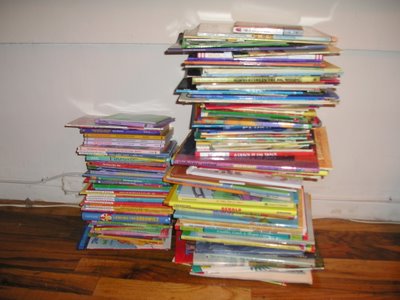 This Saturday I had the chance to attend the Project Cicero book drive. Look at all of the books I got! 153 to be exact. I think that this about doubles what I previously had in my library. I'm really excited about showing them to the kids. I got some really good read aloud books, some early readers, chapter books, a few non-fiction books (including a couple that will work with our solar system unit that we are working on) and a handful of holiday themed books. Also thrown into the mix were two books that I won't be using: a book in German and a book of bible stories. Now I just have to level some of these and then find homes for them on the few shelves that I have for our library.
This Saturday I had the chance to attend the Project Cicero book drive. Look at all of the books I got! 153 to be exact. I think that this about doubles what I previously had in my library. I'm really excited about showing them to the kids. I got some really good read aloud books, some early readers, chapter books, a few non-fiction books (including a couple that will work with our solar system unit that we are working on) and a handful of holiday themed books. Also thrown into the mix were two books that I won't be using: a book in German and a book of bible stories. Now I just have to level some of these and then find homes for them on the few shelves that I have for our library.
Wednesday, March 01, 2006
My classroom organization explained (in detail)
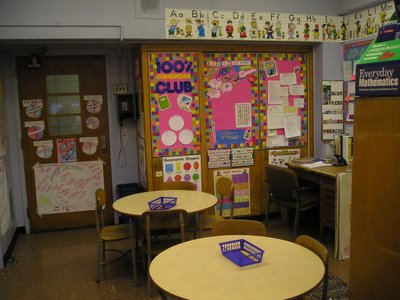
Here's another view of my classroom. Yes, this it the whole thing! The other half of the room is occupied by the math and literacy coaches at my school. (If you've been reading my blog for a while you've heard all about them.) The space is tight, but cozy.
Keep reading if you want to hear all about the organization of my room (I'm all about organization). If not, now would be a good time to stop reading.
Organization

The left side of the bookcase is part of the library. The right side organizes classroom supplies. On the top there are three tupperware boxes each containing markers, scissors, crayons and glue. On the bottom is a basket where kids can store independent reading books they are currently using. There are also folders and books that my eighth graders are using for the unit we just started.
Back Wall
Kindergarten Word Wall
White Board

I bought special paper to turn my chalkboard into a white board. I like writing with colored markers better than chalk. In the center of the board is a circle that is supposed to tell the kids when they have to be quiet, when they can be louder, etc. It's my fault I wasn't very good at keeping up with it so it kind of failed. I still think it has potential though so I keep it up there.
You'll notice a small desk to the left of the board. I use that to keep my lesson plans, worksheets, etc. for the day and it doubles as the listening center on other days.
Library
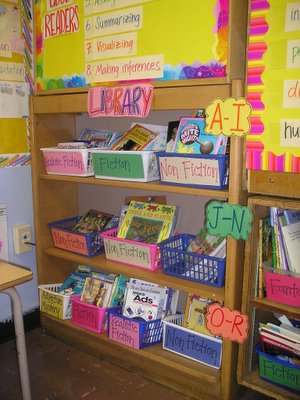
My library is leveled according to Fountas and Pinnell (which most teachers at my school don't do, actually). Since I teach K-8 I have books ranging from A-Z. Of course that means I don't have a huge selection. All of the books that I do have I either got from other teachers who could spare a few or I scrounged some up in the basement. I guess the ESL teach last year didn't have a library?
Word Wall

According to my region it should be "interactive" so if you can see, the sentence strips are sitting in clear pockets (I made them by cutting up and taping together transparencies). On the back of each word there are definitions and example sentences that the kids can refer to. A few times they have actually done this, but most of the words up there they actually don't need to reference that often. It's actually kinds of a challenge for me to have a word wall since I teach K-8 so they all need very different words.
Subscribe to:
Comments (Atom)
